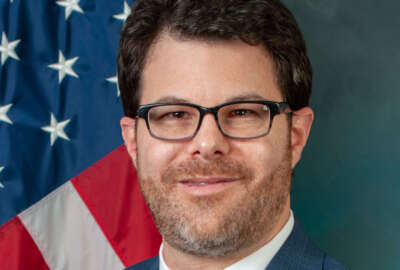
Contractors nervous as Congress hints at a government shutdown
Congress is currently flirting with the possibility of a government shutdown, as well as the potential year long continuing resolution no one wants, not to mention...
Best listening experience is on Chrome, Firefox or Safari. Subscribe to Federal Drive’s daily audio interviews on Apple Podcasts or PodcastOne.
It’s a bit of a nerve wracking time for contractors. Congress is currently flirting with the possibility of a government shutdown, as well as the potential year long continuing resolution no one wants, not to mention the fact that inflation is making it harder to conduct business and getting permission to increase prices remains difficult. For an idea of how to handle these obstacles. Federal News Network’s Eric White on the Federal Drive with Tom Temin spoke to federal sales and marketing consultant, Larry Allen.
Interview transcript:
Larry Allen: So to be clear, at the outset, let me say I think that the odds right now of a government shutdown are under 50-50. Nobody’s seriously talking about it but of course the longer the time takes to get a deal put together, the more that type of thing does loom large, I think what it really comes down to is whether or not Senator Manchin’s provision for allowing expedited energy production approval weill make it into the final continuing resolution. There are other sticking points and some details to be worked out. But that one issue seems to be the largest one that people frankly, on both sides of the aisle, are sticking out. So we’re going to have to watch that space. The other thing I will say is that I think the Senate is not really moving out with a lot of urgency here, they’re not really leaving much time for the House to come along if they want to change anything. And while that may be intentional, it’s also playing pretty risky business. There are some thin margins in both the House and the Senate right now. And if it were me, I would want to give myself a little extra time to make sure we don’t even unintentionally run into a shutdown. People trying to go conduct government business even over the weekend, you know, they suddenly find that they can’t do that, you know, that would be unfortunate. And I don’t think it would be intentional. In terms of government contract business, I think that it’s a distraction, it’s a distraction during the last week of the fiscal year. Government agencies, government officials have to act as if there will be a shutdown. So they need to go through their continuity of operations, planning procedures, just as if there would be because there could be one. So those are the people that may make also high level acquisition decisions, or try to have some impact on what their agency’s last initial decisions might be. In terms of large projects, and now they’re being pulled off into doing continuity of operations planning as well. So it’s a distraction that could slow some things down at a time of year when you don’t need that.
Eric White: Another thing that contractors seem to not want other than to shut down is also the possibility of a year long continuing resolution. Can you tell us again, why that would be not good for business and not good for agencies either?
Larry Allen: It’s not good for either, because if you’re a government agency, it really wreaks havoc with your planning. In fact, if you’re under a year long CR, you really can’t do much planning for your immediate future, you just kind of have to keep doing the things that you’ve been doing. And that runs into the big issue of a year long CR for contractors, it really means no new project starts that uses appropriated funds. So the longer you have government by CR, the more you’re just keeping current wheels spinning, you can’t really get any net new project started. Unless you can find another source of funding like a capital fund or know your money that are going to be in short supply and sometimes have some specific restrictions about how those types of funds can be used. So if you’re a contractor, you’re really hoping that you don’t go a year without any new project starts. If you’re the government, you don’t want that either. We’d have to see if we got closer to this situation, whether or not there would be some carve outs, say for the Department of Defense, because having a year long continuing resolution for the Department of Defense really would make national security preparation very challenging indeed. And I don’t think that’s really what anybody wants. Nevertheless, you do hear senior senators talking about the possibility of a year long CR somewhat seriously. So you’ve got to really watch that space.
Eric White: You talked a little bit about thin margins when it came to time but also the margins have been getting thinner for contractors as inflation is wreaking havoc on different sectors of the economy. And the news coming out recently the GSA will try and make it easier for folks to obtain price increases through those contracts. But is that what we’re seeing? And then is that what you’re hearing? Or is it you think it’s maybe a little bit too late for that.
Larry Allen: I don’t think it’s too late. But I think it’s moving much more slowly than industry would like. And what it really reflects is a disconnect between the senior management at GSA who put the policies in place, and thanks to them for doing that, acknowledging that there was a need here. And then the people at the line level, the contracting officers and contract specialists who have their own view of things and they have their own jobs to do, the contracting officers are the ones with warrants. After all, they’re moving a little bit more slowly, maybe not using the full authority, that the new flexibility is given them to move ahead with inflation based price increases. I think most contractors understand that their GSA contract price is always going to lag at least a little bit behind their commercial price. But the more that lag happens, now, the longer it takes to get those prices adjusted, that can really put a cash crunch on a company, particularly small businesses that really need that increase in order to even make payroll in some cases. So it’s a little disturbing, disconcerting to see you’ve got the senior management at GSA saying, here’s the flexibility, the contractor saying, can we please use the flexibility? And the people the line level are like, well, we’re not sure about how to use this flexibility, or just really how much flexibility we still have. And that can be frustrating. And, again, GSA is trying to make maximum use of small businesses and attract new small businesses into the market. That’s very difficult to do when you have existing small businesses that can’t get the price adjustments they need in order to not operate at a loss in many cases on each sale.
Eric White: Yeah, I mean, it’s a tough job for both sides. And you know, if when you’re guarding the idea of a runaway contractor on GSA side and the small businesses, you talked about having to operate possibly at a loss, what can a contractor do? If they’re trying to just get a price increase to to match where inflation is going? And they’re still getting denied? Is there any, any sort of avenue that they can take to readjust things or make another appeal?
Larry Allen: Well, sure, there’s always a place to go. Now, you know, my first point of advice to contractors is to make sure that you’re documenting your price increase requests to show that you’ve already invoiced other customers at the higher price and been paid. But even if that doesn’t work, and sometimes it doesn’t, you have contracting officers that want still more information. Remember, they’re at their branch chiefs, that all contracting officers report to. Sometimes branch chiefs can bring a little clarity to the matter. And even a little bit further up the food chain. There are center directors that can hopefully look at things from a more strategic viewpoint. Ultimately, it is the contracting officers decision to grant or not grant that price increase in how much of an increase they’re going to grant. But if you need to elevate things generally, as a general rule, I find that individual contractors are more hesitant to take things up the ladder than they should be. Back in my days as an association executive, I saw companies doing that all the time. So if you feel like you’ve got a good case, if you feel like you’re not getting relief, there is somebody else that you can talk to and try to get another look and maybe some common sense injected into the situation.
Eric White: Larry Allen is president of Allen Federal Business Partners.
Copyright © 2025 Federal News Network. All rights reserved. This website is not intended for users located within the European Economic Area.
Tom Temin is host of the Federal Drive and has been providing insight on federal technology and management issues for more than 30 years.
Follow @tteminWFED
Related Stories





